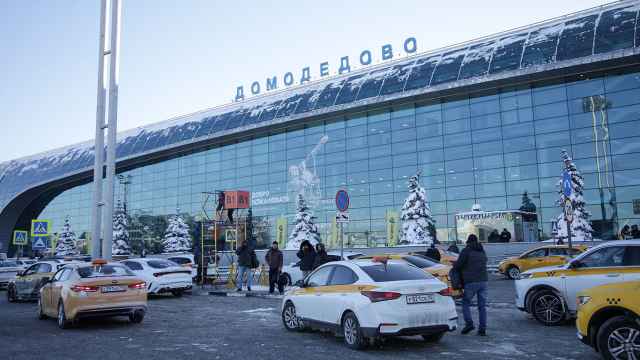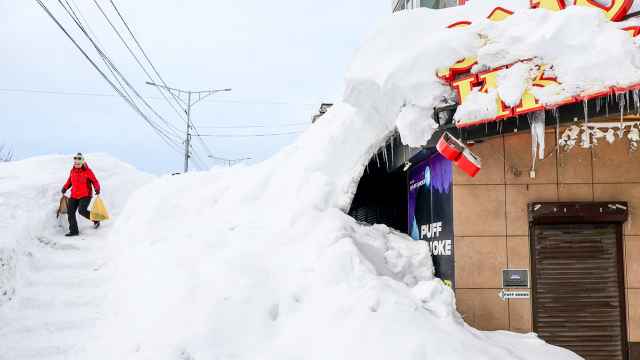Титушки: Ukrainian thugs for hire
As I've been reading the news and blogs on events in Ukraine, I came across quite a few words that I didn't understand. So I thought a little primer on Ukraine news might be useful.
But as I began to compile my primer, it turned out to have a lot of Russian nouns, slang and otherwise, used to insult people in Ukraine. So with apologies:
Евромайдан: Euromaidan. Although майдан (maidan) is a square, the word евромайдан refers to street protests over then-President Viktor Yanukovych's decision not to sign a trade agreement with the EU.
Титушки: Thugs for hire. These are the tough guys in tracksuits who act as agents provocateurs. The name comes from Vadym Titushko, a mixed martial artist who was part of a group that beat up some journalists in 2013. During the Kiev demonstrations the titushki were believed to have been brought in by the government to instigate violence.
Степан Бандера: Stepan Bandera, a leader of the Ukrainian nationalist movement. He is admired by some as a fierce protector and advocate of Ukrainians and their state; he is reviled by others as a Nazi collaborator and violent opponent of everyone he considered a threat to Ukraine, including Russians, Poles, and Jews.
Бандеровцы: Banderists, used to describe the actual historical followers of Bandera and anyone who is perceived as a Ukrainian nationalist. In the latter sense, today бандеровцы is a synonym for fascist, anti-Russian, nationalist Ukrainian scum. Кто поддерживает нацистов на бандеромайданах и призывает к фашистским бунтам, тому в Россию дороги нет. (Whoever supports Nazis at Bandera-Maidan demonstrations and calls for fascist regime change is not welcome in Russia). Here бандеро- is used as a play on евро- in евромайдан (Euromaidan).
Кукраина: derogatory term for Ukraine, apparently a mix of Украина (Ukraine) and куркуль (Ukrainian kulaks or rich peasants; slang for a rich, greedy person). Used in phrases such as Кукраины уже два дня как нет (That stupid Ukraine hasn't existed for two days).
Западенец: Western Ukrainian. Used to mean anti-Russian, nationalist, fascist Ukrainians who live in the western part of the country. Западенцы — они всегда были хитрюгами (Those Ukrainian nationalists in the west have always been sneaky devils.)
Хохол: slang for Ukrainian, sometimes derogatory or condescending. In today's political rhetoric it seems to be used to describe a "bad Ukrainian," i.e., a Ukrainian who doesn't support Russia and Russian political positions. Since there isn't a slang word for Ukrainians in English, it's hard to translate. Всех хохлов с демократической Украины, геть. (All you dumb Ukrainians — get out of democratic Ukraine)!
Молодчики: goons, thugs. Although in some literary contexts молодчик can just be a young man, in contemporary usage молодчик is a guy looking for trouble, a guy who is part of a criminal organization, or a guy who is part of a right-wing, reactionary, criminal group. Фашистские or националистические молодчики (fascist or nationalist goons) were code words for anti-Soviet, fascist youth. The Russian Foreign Ministry statement included the term воинствующие молодчики (aggressive young thugs) grouped with боевики из ультраправых националистических организаций (armed fighters from ultra-right-wing, nationalist organizations) to describe Ukrainian demonstrators.
I'm not sure how this rhetoric is going to win the hearts and minds of Russia's Ukrainian neighbors. Remember: ласковый телёнок двух маток сосёт (you get more flies with honey, literally "a friendly calf nurses on two cows").
Michele A. Berdy, a Moscow-based translator and interpreter, is author of "The Russian Word's Worth" (Glas), a collection of her columns.
A Message from The Moscow Times:
Dear readers,
We are facing unprecedented challenges. Russia's Prosecutor General's Office has designated The Moscow Times as an "undesirable" organization, criminalizing our work and putting our staff at risk of prosecution. This follows our earlier unjust labeling as a "foreign agent."
These actions are direct attempts to silence independent journalism in Russia. The authorities claim our work "discredits the decisions of the Russian leadership." We see things differently: we strive to provide accurate, unbiased reporting on Russia.
We, the journalists of The Moscow Times, refuse to be silenced. But to continue our work, we need your help.
Your support, no matter how small, makes a world of difference. If you can, please support us monthly starting from just $2. It's quick to set up, and every contribution makes a significant impact.
By supporting The Moscow Times, you're defending open, independent journalism in the face of repression. Thank you for standing with us.
Remind me later.







